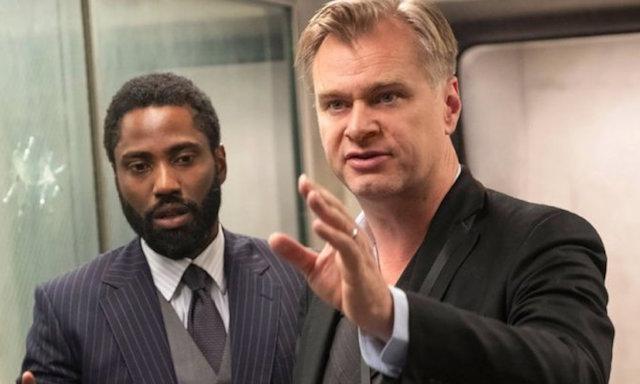For much of Christopher Nolan's career, shifting timelines and complex storylines have always played a major role.
'The Prestige', 'Inception', and of course, 'Memento' have all featured some kind of twist on the conventional linear narrative. They've worked, for the most part, although 'Tenet' has received criticism from numerous reviews that it's exceptionally hard to follow. On top of that, however, is another issue.
The sound mix in 'Tenet' is pretty awful. Explosions and Ludwig Goransson's soundtrack often drown out dialogue to a point of it being unintelligible. At least one key scene involving some pretty key story points is done during wind sailing over a crackling intercom system.
In fact, it's so bad that we had to view the movie twice because the sound mixing was that terrible the first time around that it required a second viewing. Our first viewing on the movie was done with a 35mm print, while the second viewing was done with a DCP print. DCP stands for Digital Cinema Package, which means that the audio, movie and the data streams are all done via a hard drive, not on film reels.
It wasn't just us who noticed the sound issues either.
As screenings of 'Tenet' got underway last night, a number of tweets began to surface that specifically made reference to how bad the sound mixing was in 'Tenet'.
There’s one thing about Tenet which is important to note. My friends & I thought our cinema’s sound mix was too loud. I’ve found many others are having the same problem and it’s a problem of the film itself. Some of the dialogue can be really difficult to hear clearly.
— DANIEL (@dpatt0) August 22, 2020
Does Christopher Nolan need to see an ear doctor? Serious question... hearing MULTIPLE a complaints about #Tenet regarding the sound mix, saying some scenes are impossible to hear the dialogue. I don’t understand why this is a constant choice of his?
— Andy Signore (@andysignore) August 26, 2020
Whoever was responsible for the sound in Tenet pic.twitter.com/zFWbUQGmcf
— sadi (@pastadiscourse) August 26, 2020
Don't take our word for it, either. Search 'Tenet' and 'sound' on Twitter and you'll find these tweets and about a dozen more, and probably a lot more as more people get to see it this weekend in cinemas across Ireland, the UK, and more countries.
So, the big question, why is it like this? It's hard to know precisely, but there might be a simple enough reason for it. Namely, Christopher Nolan did it on purpose. In a Reddit AMA last year, Christopher Nolan's long-time sound designer Richard King was asked why he tended to have loud music and sound effects drown out the dialogue in some scenes.
King's response is pretty revealing. "Chris (Nolan) is trying to create a visceral emotional experience for the audience, beyond merely an intellectual one. Like punk rock music, it's a full-body experience, and dialogue is only one facet of the sonic palette," he explains.
"He wants to grab the audience by the lapels and pull them toward the screen, and not allow the watching of his films to be a passive experience. If you can, my advice would be to let go of any preconceptions of what is appropriate and right and experience the film as it is, because a lot of hard intentional thought and work has gone into the mix." King was the supervising sound editor on 'Tenet', and worked in a similar role in 'Interstellar', 'Dunkirk', 'The Dark Knight Rises', and 'The Dark Knight'.
In an interview with THR in 2014, Nolan himself described the sound on 'Interstellar' - which faced similar complaints from audiences - as being "the right approach for an experimental film." Not only that, Nolan said in the same interview that he regularly views his movies in a theatre to ensure it sounds like how it's meant to sound. "Broadly speaking, there is no question when you mix a film in an unconventional way as this, you’re bound to catch some people off guard, but hopefully people can appreciate the experience for what it’s intended to be," he said.
Leaving all that aside for the minute, you have to wonder why this is the case. Sure, sound is just as important to a movie as the image is. Yet, if they don't synch up, if they don't complement one another rather than trying to overpower the other, the audience cannot follow the story that's being told. Sure, there are some scenes where it's intentional to not hear dialogue. That's a creative choice meant to be obscure the audience from knowing something so as to reveal it later, or to inform how we view the story from a place of ignorance.
'Tenet', however, is a complex story to begin with. You're talking about a movie that has a convoluted narrative, with highly specific elements that impact this, and the reality is you barely make about what the characters are explaining. How does that help anyone enjoy what's going on?



















































































